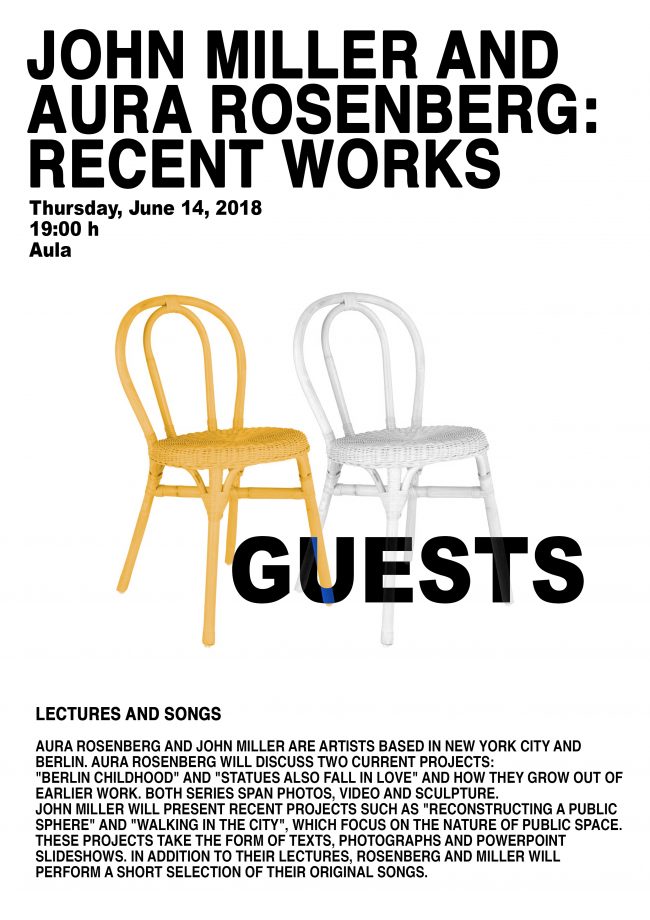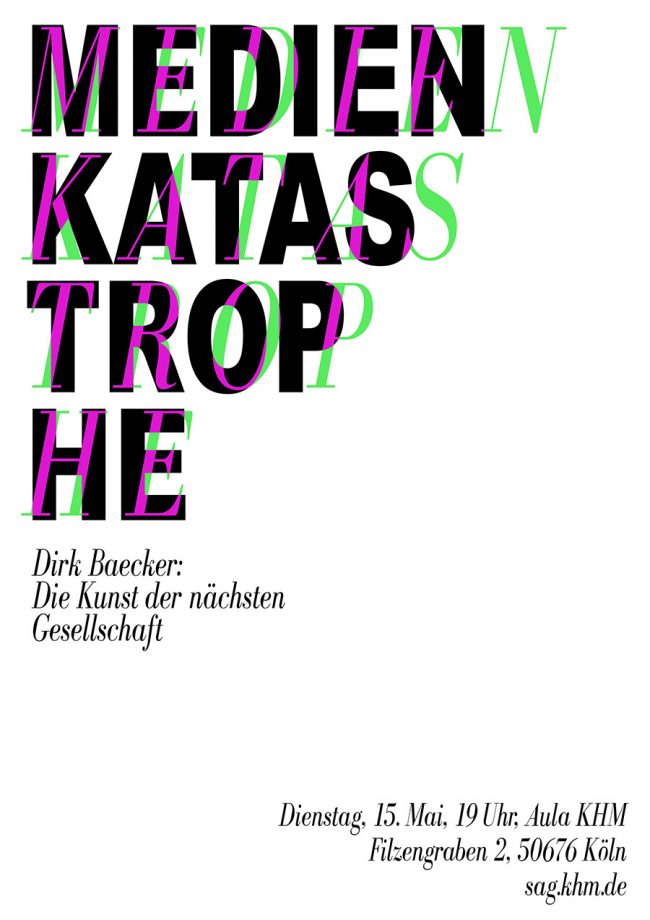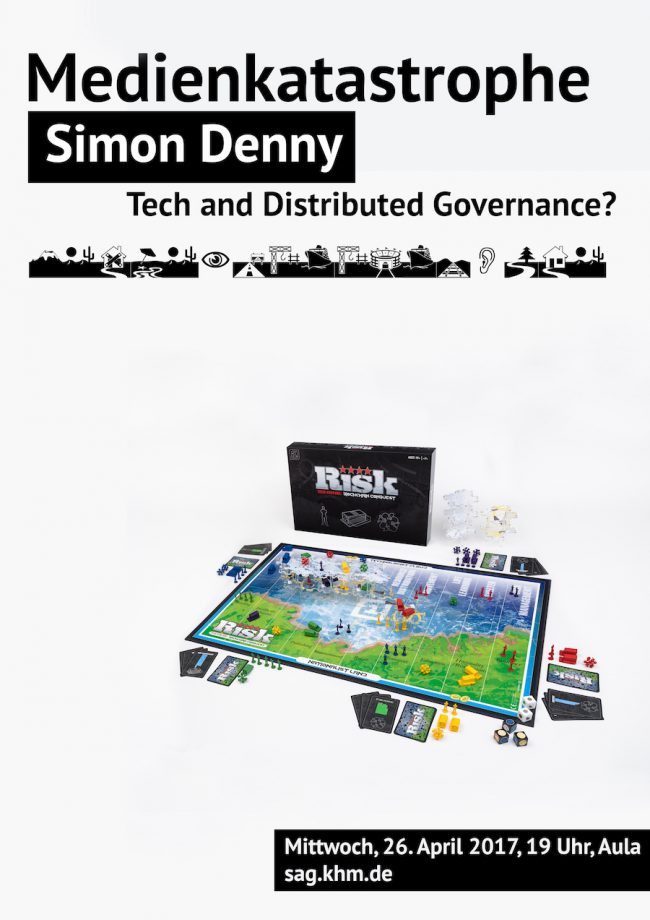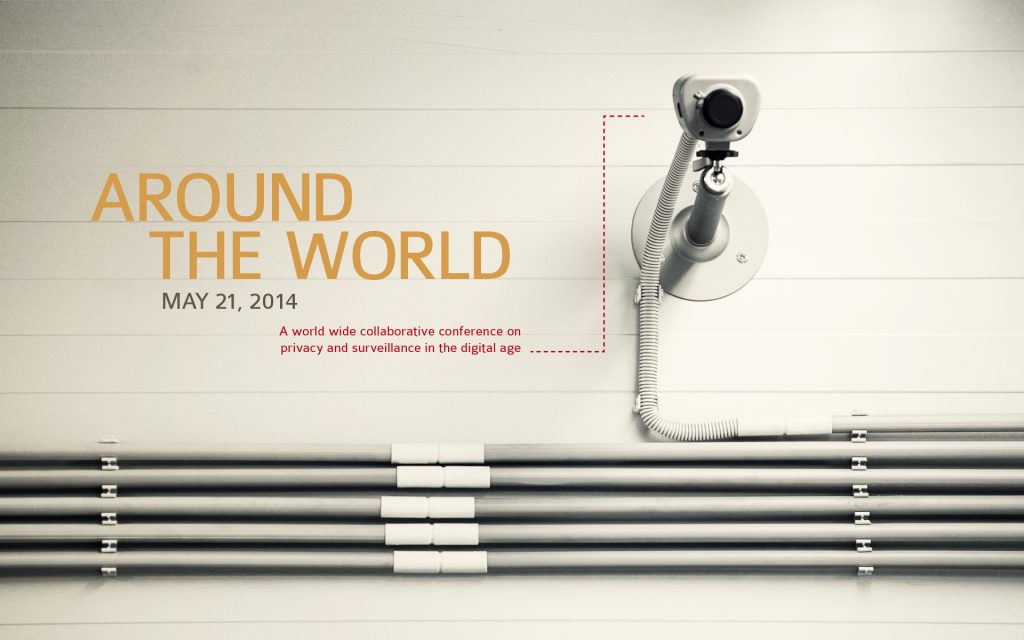John Miller and Aura Rosenberg: Recent WorkVortrag und Performance auf Englisch an der Kunsthochschule für Medien Köln (KHM)
Donnerstag, 14. Juni 2018, 19 Uhr, Aula, Filzengraben 2, 50676 Köln

John Miller and Aura Rosenberg: Recent WorkVortrag und Performance auf Englisch an der Kunsthochschule für Medien Köln (KHM)
Donnerstag, 14. Juni 2018, 19 Uhr, Aula, Filzengraben 2, 50676 Köln

“Central themes within Kerstin’s artistic investigations are the inextricable relation between the body and the world, between perception and the perceived, between sensing and sense-making.”
This special visit will include an introduction to her field of sonic architectures. She will detail her research and productions, and describe how she finds and repurposes light, sound, kinetics and traditional media towards farther thinking investigations. New notable achievements can be seen and experienced through her workin installation, electronic arts, sculpture and drawing.
Since 2016 Kerstin Ergenzingerhas been a fellow of the Berlin Center for Advanced Studies at the University of the Arts Berlin where she is working on a two year project called “Rhythmic Textures”. Recent shows include zeich[n]enKunstmuseum Bonn; Acts of Orientation, Schering Stiftung, Berlin; and unREAL: The Agorithmic Present, House of Electronic Arts, Basel and Chronus Arts Center, Shanghai.
Dirk Baecker on media revolutions and the one we’re currently in. What does it mean for art and the arts when machines start to take part in the communication between humans? What does it mean if you can begin to observe something akin to communication between machines?
As a sociologist, he has written extensively on the subject. See i.e. here or here (in German).
Prof. Dr Dirk Baecker is Dean of the Faculty of Humanities and Arts at Witten/Herdecke University and holds a Chair of Culture Theory and Management. Among his key research interests are sociological theory, economic sociology, organisational research and management theories. Baecker underlines the profound structural and cultural implications of electronic media – from telegraph, radio and TV to computers and the internet – for humans and society, comparable to the introduction of book printing (“modern society”), writing (“advanced civilisations”), and language (“tribal cultures”). According to Baecker, we live in the “next” society, with tremendous distortions between different stages of socio-cultural evolution. *
Tuesday, May 15, 19h, KHM Aula. The talk will be recorded.

the 2nd Medienkatastrophe-lecture of the summer term
Simon Denny: Tech and Distributed Governance?
lecture in English
From the rise of blockchain (the distributed ledger behind Bitcoin) to the development of management methodology ‘Holacracy’ at Zappos in Las Vegas and the intelligence agencies of the UK, the lecture will map some of the technology industry’s disruptive forces as they alter the conditions of governance.
From dreams of alternatives to hyper-liberalism, and more recently affinities with the far right, the discussion and presentation will touch on various interconnected case studies and unpack the changes being rolled out between the state and extra-state forces extending the tech community’s infrastructure, culture and influence today. As the Silicon Valley community builds and maintains what has become the interfaces for global communications, the tensions between politically nationalist governing systems and global financial and information streams continue to intensify.
Drawing on his work over the last 5 years Denny will unpack moments in this trajectory.
https://www.khm.de/termine/news.4185.simon-denny-tech-and-distributed-governance/

“The omnipresent gaze? Surveillance between visibility and the management of norms.”
Guest lecture by Dr. Nils Zurawski
Institut für kriminologische Sozialforschung at Uni Hamburg,
founder of the Surveillance Studies network
www.surveillance-studies.org
Wednesday, 13 January 2016
Surveillant Architectures Group
room 2, Filzengraben 2a
KHM Cologne
Upcoming conference in Barcelona: http://www.surveillance-studies.net/?p=1162
Wednesday, 11 November 2015, 10h30-12h00
“The European border regime in South Eastern Europe – between collapse and resurrection”
Tobias Flessenkemper, Senior Associate Researcher
Centre international de formation européenne (CIFE) – European Institute, Nice/Berlin/Istanbul
Tobias Flessenkemper is working on the issue of external and internal security policies of the European Union with a focus on South Eastern Europe and the European neighbourhood. He holds a M.A. of the University of Cologne in Political Science and a European Master in International Humanitarian Assistance of the Ruhr-University Bochum. Since 1996 he worked for international organisations in Brussels and South Eastern Europe and currently manages elbarlament.org an independent organisation working in the field of democratic governance.
2014 Privacy and Surveillance in the Digital Age
The Around the World Conference is an experiment that brings together a research dialogue without the environmental cost of traditional conferences. Institutes and researchers are invited to participate either through presenting or by joining in the discussion. The conference is live-streamed world-wide and archived after the event.

We looked at her work extensively today in seminar, but to recap and for further looking and reading, here’s a list of online materials. (Don’t forget there are quite a few catalogues in the KHM library; we also have a rare 1992 interview on VHS.)
The show at the Ludwig opens this Saturday. Also, on Friday 21. June, 2013, at 19h, there is a we’ll see the Europe-premiere of her new performance : “Men on the Line” (Museum Ludwig cinema.) Recommended!
2001 Little Frank and His Carp (Video, 6 minutes, on ubu.com)
2003 “Official Welcome (Hamburger Kunstverein)” (Video, 30 minutes, on ubu.com)
In part I this interview she talks about this piece and about the part where she strips naked. Quote:
“It is my body, in this underwear. And then I take the underwear off and I’m nude; I joke that, yes, I finally joined the grand old tradition of nudie performance art. And my other joke is that I’m not really nude because I’m in quotation marks. But, of course, I am.
Part of the reason I decided to do that was precisely to close that gap, to collapse the distance between myself as the artist named Andrea Fraser and these other positions that I was performing. And to make that distancing more difficult and problematic.”
In the 2nd part of the interview she talks about later works and writings, including “Men on the Line”, later to be shown here in Cologne (you can download the interview as a podcast here):
2011 Texte zur Kunst, “Speaking of the Social World” / “Über die soziale Welt sprechen” (German translation)
The Whitney website holds her contribution to the 2012 Whitney Biennial: “L’1% C’est Moi” & “There’s No Place Like Home”